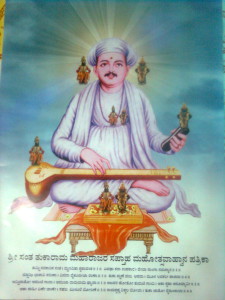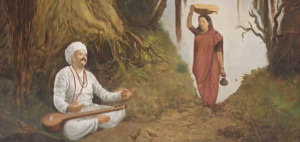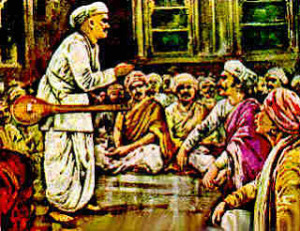The Brahmin’s Quest
Tukaram, also known as Tukoba, had firmly concluded that the only way to liberation was through ShriHari namasmarana, the continuous chanting of the holy name of ShriHari. Despite his growing fame, Tukaram remained unaware and unconcerned about his reputation.
One day, a learned Brahmin from a distant place came to meet Tukoba. Though well-versed in the scriptures, the Brahmin had not attained Self-Realization and felt discontented. He brought with him the treatise “Vivek Sindhu” written by Mukundaraj, a follower of Adi Shankaracharya’s Advaita philosophy and considered the first poet in Marathi literature.
The Brahmin said to Tukoba, “Maharaj, I have read this treatise over and over again, but I have not attained Self-Realization. Could you please explain its meaning to me?” Tukoba humbly replied, “Hey, I am not a great scholar myself. Other than Haribhakti, I know nothing. What should I do for you?”
The Reading of Vivek Sindhu
The Brahmin persisted, “I will read the treatise in front of you; please explain its meaning to me.” Tukoba agreed, lay near him, and pulled a rug over his head and body. The Brahmin started reading, continuing page after page, but received no response from Tukoba.
Curious, the Brahmin pulled the rug from Tukoba’s body and was shocked to see him immersed in Namasmarana with his fingers in his ears. Disappointed, the Brahmin said, “Maharaj, I came to you to know a suitable way to liberation. However, you have closed your ears while I read the treatise. What does it mean?”
Tukoba’s Profound Explanation
Tukoba sat up, smiled, and said, “Bhudev, God is everywhere and without achieving Him there is no liberation. One should not presume that a specific path alone would take him/her to God, which is akin to Dwaita Bhav (sense or feeling of duality). You have faith, therefore you can attain God.
When someone does not attain God through his/her spiritual practice, it does not mean that the particular practice is inadequate to attain God; it is just that the amount of spiritual practice (sadhana) is inadequate. You must have faith in whatever spiritual practice you adopt for yourself. I have faith in Namasmarana. This is the only path I know. You came to me from a distant place, but I am not sure whether my answer would satisfy you. What more may I do?”
The Brahmin’s Realization
After listening to Tukoba’s clear and honest words, the Brahmin was extremely pleased. It was a kind of Guroopadesha (divine instruction) for him. He placed his head at Tukoba’s holy feet with great faith and devotion, thanked him profusely, and returned to his native place.
The Brahmin, once filled with doubts, now returned with Bhakti (devotion). He had received the true path to liberation from Tukoba.
Reflection on the Story
Faith in Spiritual Practices:
- Tukaram emphasizes the importance of faith in one’s chosen spiritual practice. Without faith, no amount of effort can lead to realization.
Diversity of Paths to God:
- Tukaram teaches that there are many paths to God, and one should not rigidly adhere to a single method, believing it to be the only way.
The Power of Namasmarana:
- Tukaram’s own practice of continuous chanting of the holy name demonstrates its power and efficacy in achieving divine connection and liberation.
The Role of a True Guru:
- The story illustrates how a true guru can provide profound insights and clear doubts, leading a disciple to the right path with simple yet powerful guidance.
Lessons to Be Learned
- Faith in Devotion:
- Believing deeply in the efficacy of one’s chosen spiritual practice is crucial for attaining spiritual goals.
- Acceptance of Multiple Paths:
- Recognize that there are various valid paths to the divine, and respect the diversity in spiritual practices.
- Simplicity in Spirituality:
- Sometimes the simplest practices, like chanting the holy name, can be the most effective in achieving spiritual realization.
- Guidance from a Guru:
- The guidance of a true guru can dispel doubts and provide the clarity needed to progress on the spiritual path.
In summary, the story of Tukaram and the Brahmin teaches us about the importance of faith, the recognition of diverse spiritual paths, the power of Namasmarana, and the invaluable role of a guru in guiding disciples towards liberation. Tukaram’s simple yet profound message emphasizes that sincere devotion and continuous chanting of the divine name can lead to ultimate realization and liberation.



